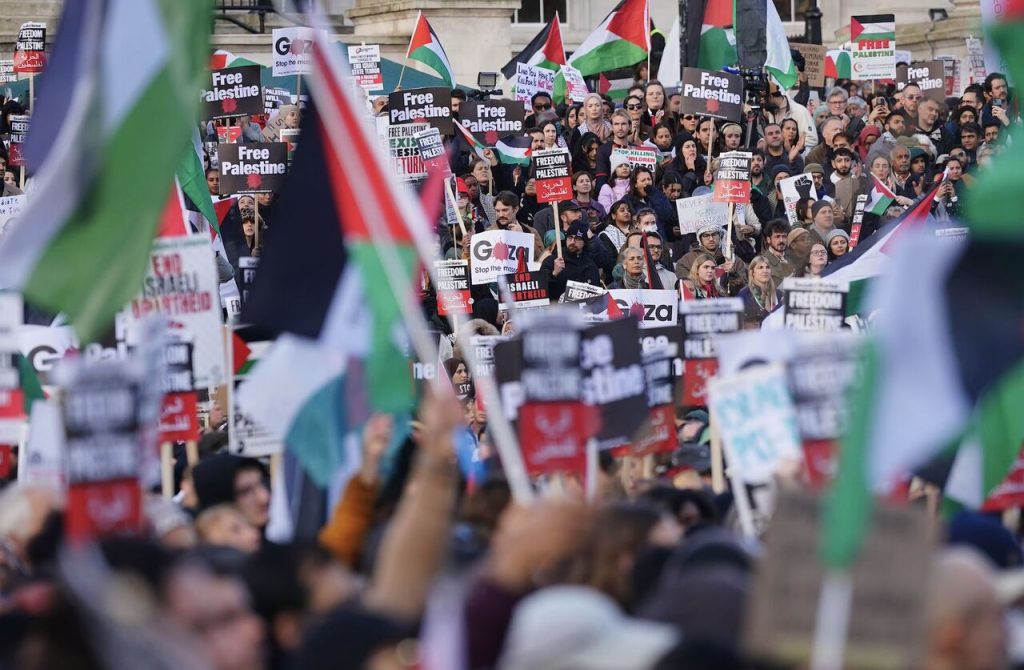Silent Voice Against Genocide / Corbyn: Mainstream Media Failed Gaza Test.
The guide, titled “Journalism in a Time of Genocide,” was distributed to journalists and includes a series of fact-finding questions about the British government’s role in providing military, intelligence and political support to the Israeli regime during its relentless attacks on the Gaza Strip. It also warns the media that their indifference or inaction is normalizing and complicity in the crime.
Jeremy Corbyn, former leader of the Labour Party and a member of the Independent Coalition, which includes MPs such as Shawkat Adam, Ayub Khan, Adnan Hussein, and Iqbal Mohammed, told the media: “Gaza was a test for the mainstream media. They failed. They failed to defend their colleagues who were being murdered abroad, they failed to respect the equal value of all lives, and they failed to hold our government to account for their complicity in crimes against humanity. This is how genocide is normalized, and the media has been shamefully successful in doing so.”
A list of questions for the British government
The published guide is designed around five main themes, including the sale of F-35 fighter jet parts to the Israeli regime, the use of British military bases in Cyprus for Israeli operations, the government’s silence on genocide accusations, the need for an independent investigation, and general questions about the London-Tel Aviv relationship. Among the key questions recommended for journalists in the guide are the following:
• When will the government publish a full list of military equipment sent from the UK to Israel?
• Will the government release footage of RAF spy planes over Gaza?
• Why has the government not yet agreed to recognize the term “genocide” concerning Gaza?
• Is the Prime Minister prepared to amend his previous statements in Parliament denying genocide?
• Does the government agree to an independent and public inquiry into the UK’s role in the Gaza war?
The guide also points to the crucial role of the British-controlled Akrotiri and Dhekelia military bases in Cyprus, and notes that, according to published documents, these bases have been used to transfer weapons to the Israeli army and conduct reconnaissance flights over Gaza, without any parliamentary oversight or transparency.
In the analysis section of the guide, the authors, citing statistics from international organizations, emphasize that the war in Gaza, which began in October 2023, has killed at least 52,000 Palestinians and injured more than 119,000. In addition to these horrific figures, more than 232 journalists, mostly Palestinians, have also lost their lives, making it the deadliest conflict for journalists in history.
The Corbyn-led coalition has accused the British media of either remaining silent or reflecting the official government narrative rather than playing a watchdog and whistleblower role. The coalition calls on the media to accept the price of whistleblowing, even if it means damaging their personal or professional relationships.
The guide concludes: “There is a cost to exposing the truth. In Gaza, journalists have paid the price with their lives. In Britain, the cost may be a mere blow to professional ambitions. But amid a genocide, the cost is certainly worth paying.”
The publication of the guide comes just days after hundreds of activists and supporters of Palestinian rights gathered in front of the BBC building in London, chanting slogans against “one-sided coverage,” accusing the media of siding with the Israeli regime and ignoring the human dimensions of the war in Gaza. The rally displayed images of child victims in the Gaza Strip, and protesters called for an end to the “systematic censorship of the Palestinian narrative.”
The mainstream media, including the BBC, has yet to respond to the guidelines and the criticisms officially. However, the British media landscape is entering a critical phase in which the actions of editors, reporters and news organizations are being scrutinized by public opinion and civil society.
Of course, Corbyn and his coalition are just one of the growing pressures on the British government over the Gaza war. Since the start of the new round of Israeli attacks, Keir Starmer’s government has only partially suspended arms export licenses and has refrained from explicitly using the term “genocide.”
The Independent Coalition has once again questioned the dual nature of London’s foreign policy by asking why the British government does not apply the same standard to Israel as it does to Russia. From this perspective, the published guide can be seen as an attempt to break the silence and restore media responsibility in the face of crimes against humanity.

